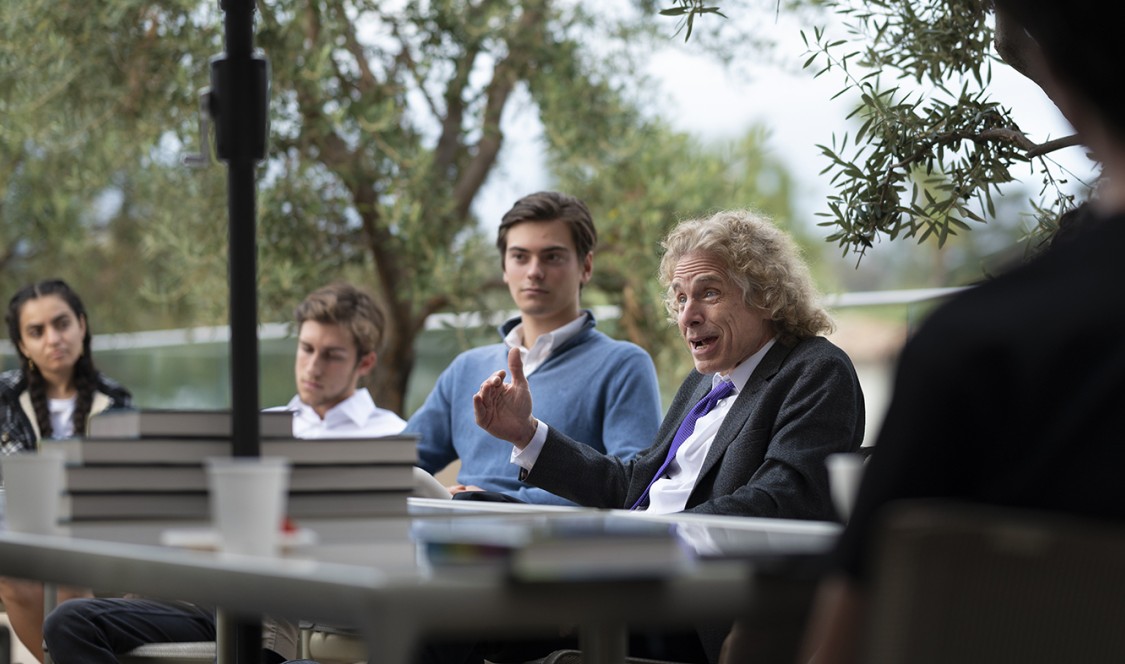Are we healthier, richer, freer, safer, and happier than our ancestors? Whatever our personal feelings in the face of dismaying news about racism, climate change, or the pandemic, the data point to yes, says Steven Pinker.
The award-winning experimental cognitive psychologist and bestselling author made the case for “Progress and Enlightenment in the 21st Century” in an Oct. 7 lecture at CMC’s Marian Miner Cook Athenaeum. Pinker is Johnstone Family Professor of Psychology at Harvard and one of Time’s 100 most influential people in the world.
While exploring progress in poverty, racism, violence, and other areas at the forefront of cultural debate, Pinker’s talk also explored “civilization and commerce,” one of three enduring themes (along with “unity and division” and “science and policy”) that have shaped the intellectual life of CMC and are the focus of the Athenaeum’s 75th Anniversary distinguished speaker series.

Pinker began with a shout-out to CMC for being designated No. 1 of 159 colleges and universities in the 2021 Campus Free Speech Rankings. Remarking that Harvard “came out 130,” he provoked laughter from the crowd. “I’m going to go back and tell them that they have much to learn from Claremont McKenna College,” he said.
He also focused on CMC’s motto, “civilization prospers with commerce,” while adding that data support the idea. “Now that is a deeply uncool idea. But … I'm going to indicate why there is a considerable amount of truth in that model.”
Before a live audience and others via Zoom, Pinker asked: What is progress? How have we made progress? And how did that progress happen? These are big questions which he has tried to answer in two books, Enlightenment Now and Rationality, the latter of which came out the week before his visit to campus.
“I define progress as improvements in human flourishing,” Pinker said. “Human flourishing would consist of dimensions such as life, health, sustenance, prosperity, peace, freedom, safety, knowledge, leisure, and happiness. If they’ve increased over time, that, I submit, will be progress.”
Progress, he argued, is “a real phenomenon visible in data, not a matter of optimism.” Indeed, the data he shared revealed significant upward trends in human flourishing over centuries. But surprisingly, the United States does not lead the way in progress. “We, the United States, compared to our western democratic peers, underperform on most measures of human flourishing,” Pinker said.
The causes of progress, Pinker posited, are reason, science, and humanism. “When people deploy their brainpower to try to make their fellows better off … then you can see increments of human well-being. And that’s what we call progress.”

Pinker’s intellectual rigor and enthusiasm also sparked an engaging conversation for students before the Ath talk at a small gathering organized by Prof. George Thomas of the Salvatori Center. Pinker acknowledged that his CMC appearance was his first in-person since February 2020. More than 20 CMC students seized the opportunity to discuss the topic, “Is Rationality Uncool?” with the author.
During their conversation, students tapped Pinker’s research and knowledge on the evolution of language (such as the “euphemism treadmill”), how to grapple with stereotypes, and former taboos that have seeped their way into our culture. They also asked Pinker, who uses statistics in his work to outline trends, to expand on how the news media could better offer statistical context to their reporting.
“It was a thrill to hear him talk in real time with our peers,” said Tara Dawood ’25 after the Salvatori discussion.
Nolan Windham ’25 added: “Nowhere else but CMC could you have this intimate of a conversation with one of the most influential people in the world.”

